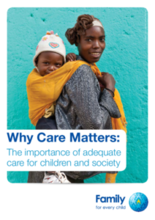Family for Every Child is aimed at enabling more children to grow up safe and protected in families and to access temporary, quality alternative care when needed. This report incorporates the views and collective expertise of the 15 national organizations working directly with vulnerable children worldwide that came together to form Family for Every Child.
This report highlights the needs of children without adequate family care, the impact inadequate care has on children and society, and why family care is important. Some of the negative impacts on children, according to the report, include: a lower likelihood of attending or doing well in school, less access to health care and other needed services, higher likelihood of engaging in antisocial or criminal behaviors, child exploitation and abuse, and compromised physical, emotional, and cognitive development. Furthermore, inadequate care often has lasting effects on children into adulthood, including: inability to access employment, higher rates of poverty, and increased dependence on state welfare or social transfer programs. As such, the inadequate care of children impacts states’ social and economic progress, including their ability to reach development goals. Therefore, addressing inadequate care of children is essential to achieving equity in all sectors of society, especially as children in care are often those who are most vulnerable and marginalized.
In this report, Family for Every Child also issues several recommendations for those in all sectors of society, including: child protection specialists, national and international NGOs, government officials, humanitarian workers, educators, health care professionals, businesses, media, and families. The recommendations in the report center around ensuring adequate care by supporting family care for children. According to the report, achieving more effective family care for children means strengthening the ability of vulnerable families and communities to adequately care for their children by: (1) building a deeper understanding of a family’s context and culture, (2) making the care of children a political and financial priority, (3) reinforcing the inclusion of effective care of children as a part of greater humanitarian work, (4) increasing social protection for vulnerable families, and (5) ensuring that countries adhere to the Guidelines for the Alternative Care of Children. It also means increasing child participation and inclusion in decision-making, and enhancing family-based alternative care. The report also includes an example of progress in care reform in Brazil.

